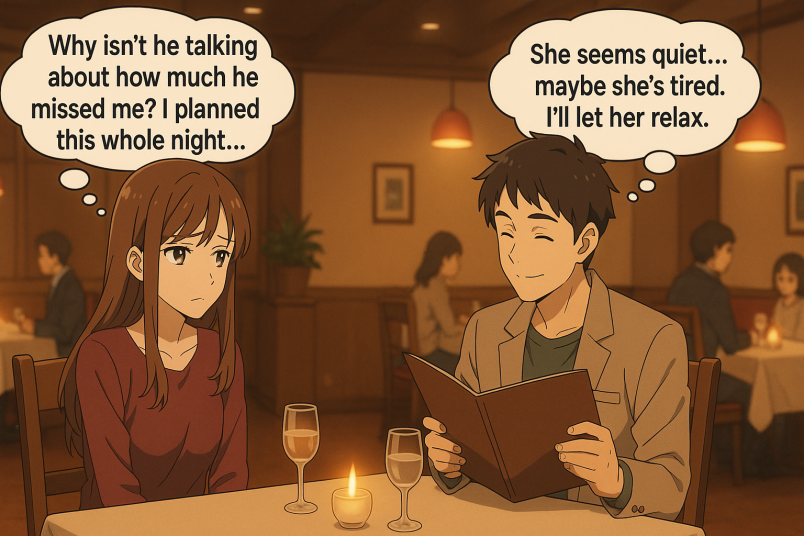10 Ways to Avoid the Trap of High Expectations in a Relationship

Heal & Grow Daily for a Happier Relationship
Subscribe FREEKey Takeaways
Marriage.com AI Quick Summary
Ever find yourself wishing your partner could read your mind, always know what to say, or love you in the exact way you imagined?
It’s such a common trap… and it often sneaks up quietly, disguised as wanting connection or effort. But when every little thing starts feeling like a test, it’s not really love we’re chasing; it’s control or perfection.
The truth is, no one can live up to the story we build in our heads. And yet, it’s so easy to expect too much without meaning to. If you’ve ever felt that mix of disappointment and guilt, you’re not alone.
Learning to ease those high expectations in a relationship can make space for something softer, more real, and deeply fulfilling.
What is the trap of high expectations in relationships?
The trap of expectations in relationships refers to the tendency to have unrealistic or uncommunicated expectations of one’s partner, which can lead to disappointment and frustration when these expectations are not met.
The meaning of high expectations in relationships is simply wanting perfection instead of connection.
Research was done on how relationship expectations affect relationship quality. Findings show that positive expectations often enhance satisfaction, commitment, forgiveness, and trust, though in some cases they can harm healthy functioning. It also presents a model explaining how expectations can both strengthen and undermine relationships.
It can create a negative cycle of blame and resentment and undermine the emotional connection between partners. It’s important to communicate expectations clearly and work together to meet each other’s needs rather than placing unrealistic demands on one another.
What happens when reality doesn’t equal our expectations?
Disappointment and more fear. That’s the likely result when you have high expectations in a relationship.
The bad thing about expectations is that they become a way of life, even when life doesn’t turn out the way we expect. Instead of discounting our expectations, we simply discount the person or situation in which we find ourselves.
All of this continues to make us feel like we have some sort of control or insight into our lives. It’s a huge trap we probably don’t even realize we are caught in.
10 ways to avoid the trap of high expectations in a relationship
Expectations rarely help anyone. While we can think about possible future scenarios at times, we cannot come to expect certain outcomes. The more we cling to how things should be, the less we appreciate what already is.
Relationships breathe easier when we allow space for imperfection, for real moments that aren’t scripted or ideal.
So, how can we stop the trap of relationship expectations?
Here are 10 ways that just might work for you in understanding how to stop having high expectations in a relationship:
1. Have a little faith
Stepping into the dark will require you to trust your partner and yourself. Have a little faith!
You’ve made it this far together, right?
Take your partner’s hand and just go for it. When you both encounter a new situation, place, venture, or whatever, try to focus on the fact that you are both going through it together instead of the scariness of it.
Have the attitude that “whatever will be will be.” Of course, you can prepare for the worst, but also hope for the best.
Here’s what you can do:
- Practice gratitude for the small things your partner does each day.
- When uncertainty creeps in, remind yourself of the moments when trust paid off.
- Replace “what if” thoughts with “even if” — it helps you stay grounded in trust.
2. Focus on today
When you are too caught up in figuring out what tomorrow will bring, you are missing out on the amazing things that can happen in the here and now. Maybe you’re nervous about your husband leaving for a long business trip.
Instead of thinking about all of your expectations about how you will say goodbye and when you should call each other, focus on today. You are still together now, so make the most of it. Don’t let future expectations spoil the happiness you could have now.
Here’s what you can do:
- Plan a simple shared activity that helps you connect right now.
- Use mindfulness or journaling to remind yourself to stay in the present.
- When your mind drifts to the future, gently bring it back with a deep breath and a smile.
3. Talk it out
The only way you and your partner will know what the other person is thinking and expecting is to talk about it.
According to Christiana Njoku, LPC:
In order to avoid disappointment resulting from high expectations in a relationship, it’s important to communicate about anything and everything to be sure you and your partner are on the same page.
Facing your first holiday season together?
Talk about your family traditions, and discuss which ones you really want to keep going forward as you form your own family. This will help keep expectations at a healthy level and not leave anyone in the dark while having high expectations in a relationship.
If you fail to talk about things, someone will end up being disappointed; they will expect you to just “know” how things will go. Don’t be afraid to speak your heart, even about the little things.
Here’s what you can do:
- Set aside time each week to talk about how you’re both feeling.
- Use “I” statements instead of blame to express your needs.
- Listen without interrupting — sometimes, being heard is all your partner needs.
4. Cut yourself some slack
Too high expectation leads to disappointment.
When we think of our future selves, we probably picture a thinner, more successful version of ourselves.
Is it attainable? Maybe.
Is it healthy to try to be that person? Sure, within reason.
But let’s be clear here. Sometimes we make our goals unattainable, or maybe something happens in our lives that gets in the way, such as health problems or career setbacks. So, our expectations for ourselves never get met; in the process, we just feel miserable and like failures.
Cut yourself some slack! Stop expecting so much of yourself. Find the balance between being your best self and who you can be now. Realize there is no deadline, and no one is grading you but yourself.
Here’s what you can do:
- Replace negative self-talk with kind, realistic affirmations.
- Take breaks when needed without guilt — rest helps you reset emotionally.
- Celebrate small wins instead of waiting for “perfect” results.
5. Meet your partner where they are
As you did in #4, do the same for your partner. They are going through some stuff. They have faults they are working on that they want to do better at, but sometimes they will fail. Don’t set your expectations of them so high that they can never attain them.
A study explored how mutual understanding develops within couples through communication that supports relationship stability. Using in-depth interviews with four Christian couples, it identified three major themes: understanding your partner, self-understanding, and realistic interaction. Findings showed that empathy, awareness, acceptance, and faith strengthen emotional connection and relationship growth.
Chances are, they are already doing that for themselves. Simply meet your partner where they are. Know that they are a great person capable of great things, but that they are human. And you love them no matter what.
Here’s what you can do:
- Notice and acknowledge the effort your partner makes, even when it’s small.
- Let go of the urge to “fix” them — choose compassion instead.
- Remind yourself that growth takes time, and progress looks different for everyone.
6. Be realistic about the relationship
Evaluate what your expectations are in a relationship. It’s important to remember that your partner is a human being with flaws and imperfections.
Nobody is perfect, and expecting your partner to be flawless is unrealistic. It’s also important to be realistic about the relationship itself and avoid having high expectations in a relationship.
Every relationship has its ups and downs, and it’s not always going to be perfect. Having realistic expectations will help you appreciate the good times and work through the challenges.
Here’s what you can do:
- Remind yourself that disagreements are normal — not a sign of failure.
- Focus on what’s working instead of dwelling on what isn’t.
- Revisit your expectations regularly to make sure they still feel fair and balanced.
7. Take charge of your happiness
Many people enter into relationships expecting their partner to make them happy. However, this is an unrealistic expectation. Depending on your spouse for your fulfillment is one of the examples of expectations set too high.
Your happiness should come from within, not from your partner. Instead of relying on your partner for happiness, focus on finding joy in your own life. Pursue your hobbies and interests, spend time with friends and family, and take care of yourself.
Here’s what you can do:
- Reconnect with activities that make you feel alive and confident.
- Spend time with loved ones who uplift and energize you.
- Make self-care a daily practice, even in small ways like a walk or journaling.
8. Communicate openly with your partner
Communication is key in any relationship. Be open and honest with your partner about your needs and expectations. If you have concerns or fears about the relationship, discuss them with your partner.
Communicating openly allows you to work together to set realistic expectations for the relationship. It also helps prevent misunderstandings from turning into bigger issues that could quietly build resentment over time.
Here’s what you can do:
- Create a “safe space” where both of you can talk without judgment.
- Check in regularly about emotional needs, not just logistics.
- Be patient — honest communication grows stronger with time and practice.
9. Avoid comparing your relationship to others
It’s easy to look at other relationships and feel like your own falls short. However, comparing your relationship to others is a recipe for disappointment.
Christiana Njoku highlights that:
If high expectations in life, such as career, marriage, and other areas of life, are not met, it results in disappointment.
Every relationship is unique; what works for one couple may not work for another. Instead of comparing your relationship to others, focus on what makes your relationship special and meaningful.
Here’s what you can do:
- Limit time spent on social media when it triggers comparison.
- Celebrate your own milestones, however small or unconventional.
- Talk openly with your partner about what makes your connection feel real and unique.
10. Don’t rush things
It’s easy to get caught up in the excitement of a new relationship when you want things to be exactly as you’ve pictured. However, it’s important to note that as the relationship progresses, it matures and becomes more practical.
Give time for things to fall into place and make sense. Rushing into every aspect of being in a relationship or marriage will only complicate things for you two. Having too high expectations in a relationship will only lead to resentment.
Here’s what you can do:
- Let milestones unfold naturally instead of forcing them.
- Enjoy the discovery phase without turning it into a checklist.
- Practice patience by appreciating progress, not perfection.
Watch this video where Anna Runkle, an author and educator, explains why rushing into relationships hurts you in the end:
How to recognize when expectations are getting too high
Sometimes, it starts quietly. You may begin feeling a little disappointed more often or wish your partner would just “get it” without you saying a word.
You might tell yourself it’s normal… but if frustration or distance keeps growing, it’s worth pausing to look closer. Expectations can slowly shift from healthy hopes to silent demands, and that’s when love begins to feel like pressure instead of peace.
Here are a few signs to watch for:
- You often feel let down, even when your partner is trying.
- Small mistakes or changes bother you more than they should.
- You compare your relationship to others a little too often.
- You find yourself replaying what “should have” happened.
- You expect emotional perfection instead of emotional effort.
When these patterns start showing up, take a breath and remind yourself that your partner isn’t meant to fill every need or read every thought. Love grows best when both people feel seen for who they are, not who they’re expected to be.
Embracing love as it is
Love isn’t about perfection; it’s about patience, care, and growing together through the messy parts, too. When we let go of how things “should” be, we make room for how they truly are. It’s amazing how much lighter love feels when it isn’t burdened by silent demands or impossible standards.
The truth is, high expectations in a relationship don’t build closeness; understanding does. So, take a deep breath, stay curious about your partner, and choose grace over pressure. Ultimately, love thrives not because it’s flawless, but because it’s forgiving, flexible, and beautifully real.
 Tips
Tips
Write your tip or submit a video tip
All tips are reviewed before the publishing.
Share this article on
Recent Articles
Related Quizzes
Heal & Grow Daily for a Happier, Healthier Relationship
Subscribe FREE on YouTube We'd love your feedback!
We'd love your feedback!
 Expert Q&A
Expert Q&A
Ask your question related to this topic & get the support you deserve from experts.





















 Thanks for your feedback!
Thanks for your feedback!